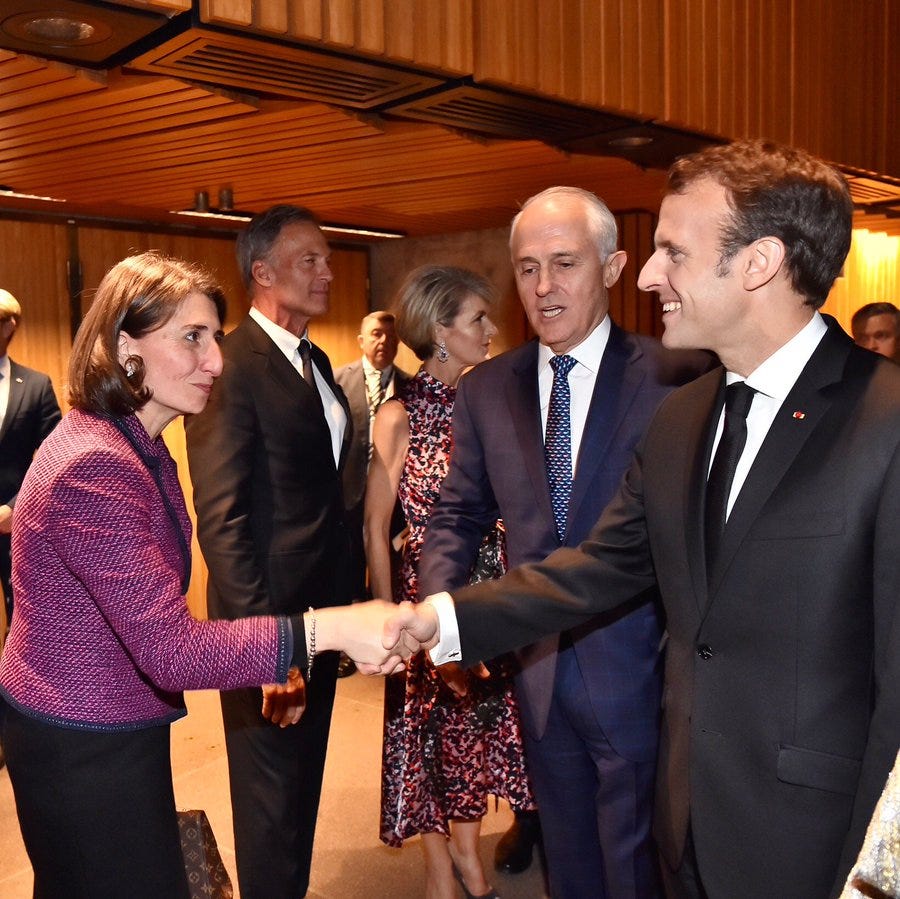For better or worse, the all-consuming gravitational pull of AUKUS gives this week’s newsletter a singular focus. Let me freely acknowledge up front that the scale and significance of the AUKUS developments mean that the following analysis won’t cover the full gamut of issues.
The tightening ties that bind
A senior US official speaking about AUKUS and quoted in The Financial Times on 16 September:
“This is a fundamental decision that binds decisively Australia and the United States and Great Britain for generations.”
Quick take:
In addition to the expanding presence of US personnel and platforms in Australia announced at AUSMIN, AUKUS entails deepening Australian dependence on US technology and knowhow and paves the way for even greater interoperability between US and Australian forces. Of course, these kinds of developments are not entirely unique given the Australian purchase of F-35s, the US Marines’ presence in Darwin, and regular high-end US-Australian military exercises, among a wide range of other forms of military and capability cooperation. But the sheer scale of the expansion of the defence technology and procurement relationship—from nuclear-powered submarines to hypersonics—combined with the ramping up of US force posture in Australia represents a dramatic tightening of the strategic embrace between Canberra and Washington.
Canberra won’t necessarily be forced to accept holus-bolus Washington’s foreign and defence policy goals and strategies as a result. But Australia will likely become an increasingly important part of US grand strategy in the Indo-Pacific. The United States will probably rely more heavily on Australian military bases for sustainment and power projection into the region and will seek to cooperate more closely with Australian forces to deliver diplomatic signals and deterrent effects in the South and East China seas and in the Taiwan Strait. This deepening Australian enmeshment in US grand strategy is not bad per se, but it does come with serious political, diplomatic, and military risks for Australia.
The United States has embraced a bipartisan policy of forward-leaning strategic competition with China spanning the diplomatic, military, political, technological, and economic domains. Although Australia’s overarching goals align with those of the United States on a wide range of China policy questions, there are key areas of divergence and even disagreement with Washington. First and foremost, on trade and economic policy in the World Trade Organization (WTO) and beyond, but also regarding the use of sanctions diplomacy and the appropriate response to China’s maritime and territorial claims.
Moreover, and perhaps more importantly, there’s the very real possibility that future US administrations will embrace China policies that are further removed from Australia’s preferred approach. (How viable are Mike Pompeo’s or Marco Rubio’s 2024 presidential paths?) Meanwhile, there’s the ongoing risk of political dysfunction at the highest levels of US power. Regardless of the ground truth on the final months of the Trump presidency, Bob Woodward and Robert Costa’s account of political chaos and diplomatic backchannels makes plain the potentially grave risks of being so closely militarily bound to the United States.
These considerations do not necessarily mean that AUKUS and the deepening United States-Australia bilateral relationship will be net negatives for Australian interests. One could plausibly argue that the military capability gains alone are worth the diplomatic blowback from Paris and the attendant risks of being implicated in the potentially erratic and aggressive US exercise of military power. But for the purposes of establishing realistic expectations in Washington, allaying fears in the region, and reassuring the Australian public, it might be beneficial for the Australian government to follow AUKUS and AUSMIN up with a reiteration of Australia’s strategic autonomy. This wouldn’t need to be a departure from past practice given Foreign Minister Marise Payne’s explicit differentiation of Australian positions from those of the US at last year’s AUSMIN.
Taiwan’s take
Taiwan’s Vice President, Lai Ching-te, welcoming AUKUS via Twitter:
“Taiwan welcomes #AUKUS as a positive development for democracy, peace, and prosperity in the region.”
Quick take:
The AUKUS announcements coincided with noticeably stronger AUSMIN language on Taiwan, which this year labelled Taiwan a “critical partner for both [the United States and Australia].” This represents a significant upgrade from 2020’s milder language of a shared “intent to maintain strong unofficial ties with Taiwan.” But shifts of diplomatic language in the AUSMIN Joint Statement aside, members of the Taiwanese government believe AUKUS also represents a significant strategic gain for Taiwan.
The full range of reasons are open to debate, but it seems likely that they span a wide spectrum of diplomatic and strategic considerations:
The added deterrent effect of Australian naval platforms that are capable of staying on station in maritime East Asia for longer, including in Taiwan’s maritime approaches;
The prospect of a closer alignment between US and Australian foreign policy goals and strategies in East Asia as strategic competition with China emerges as the organising principle of US foreign policy;
The expected interoperability gains for US and Australian military platforms, especially in the realm of high-end naval warfighting and maritime, air, and land strike;
The expanded US military access and presence in Australia, which will incrementally increase the deterrent effect against China;
The signal that AUKUS sends to Beijing about added Allied resolve in East Asia and the Indo-Pacific more broadly; and
The confirmation that AUKUS provides of enduring US determination to work more closely with (some!) allies.
This is probably not a complete list of Taiwan’s reasons for supporting AUKUS. Nor are any of these reasons beyond debate. It remains unclear whether these developments would be a net positive for Taiwan given AUKUS’ range of so-far unknown second-, third-, and fourth-order effects. To take just one example, Beijing’s practical response to AUKUS remains unclear beyond an unsurprising diplomatic broadside. The full impact of AUKUS on the People’s Liberation Army’s (PLA) force modernisation and strategy remains to be seen and will presumably only play out over the course of years and even decades. (This, of course, is not to say that PLA acquisitions would have stalled in the absence of AUKUS. The point is simply that AUKUS will factor into Beijing’s policy planning.)
Regardless of the known unknowns (and unknown unknowns) of AUKUS’ impact on Taiwan’s security, the above list of Taipei’s possible reasons for supporting the trilateral security partnership highlights the enormity of this strategic leap for Australia. If this account of Taiwan’s reasons for supporting AUKUS is broadly correct and Taipei is on solid ground in making assessments 1-6 (granted, two big ifs!), then the agreement puts the Australian Defence Force (ADF) much more firmly in the business of delivering a high-end military deterrent effect to the PLA over any possible Taiwan Strait contingency.
Is that a welcome development for Australia and the Indo-Pacific? Any attempt I could muster to answer that question in a few hundred words would be woefully inadequate. That evasive manoeuvre notwithstanding, I’d at least argue that moves to position the ADF to deliver a military deterrent effect in Taiwan’s maritime approaches need not come at the expense of the many cheaper, easier, and immediately implementable strategic deterrent measures available to Canberra.
The range of concrete policy options that could assist Taiwan now include establishing a de facto defence attaché office in Taipei or incorporating Taiwanese Armed Forces personnel in multilateral security training and exercises. Of course, these deterrent measures aren’t comparable to long-range nuclear-powered submarines or enhanced maritime, air, and land strike capabilities. But these alternative deterrent options raise (to my mind at least) the critically important question of the nature of the deterrent role that Australia should seek to play in any possible Taiwan Strait contingency. Difficult though the debate may be, it’s not one that the Australian people can easily avoid.
The French connection
European Affairs Minister Clement Beaune speaking about ongoing European Union-Australia free trade agreement negotiations in the wake of the AUKUS announcement:
“I don’t see how we can trust our Australian partners.”
Quick take:
Beyond the heat of Paris’ immediate response to AUKUS, the cancelling of the Future Submarine Program (FSP) is likely to pose long-term challenges for Australia’s broader Indo-Pacific strategy. An element of the Australian government’s project of building a “strategic balance of power that favours freedom” in the region has been fostering a joined-up effort to counterbalance China’s growing military power and economic and political influence across the Indo-Pacific. And France was one of the key regional powers and most significant European state that Australia was cooperating with in this effort.
As a resident power in the Indo-Pacific with deep and abiding concerns about China’s statecraft, the AUKUS decision won’t cause France to disengage from the region or take a dramatically rosier view of the Party-state’s external polices. But France’s displeasure appears likely to adversely impact Canberra’s effort to cooperate with Paris to pursue shared regional goals. Last month’s inaugural Australia-France 2+2 Ministerial Consultations canvassed an ambitious range of areas of military, political, economic, and scientific cooperation in the region. The intensity of Paris’ frustration with Canberra would seem to suggest that a tangible and sustained downgrade of at least some of this cooperation is on the cards.
To be sure, it remains to be seen whether the negative impact on the bilateral relationship will last. Short-term domestic considerations in France, including next year’s presidential election and the immediate economic fallout of the FSP’s collapse, are probably partly fuelling Paris’ fury. But regardless of the impact on the Australia-France relationship, the early signs are that the AUKUS partnership has made the task of building a durable balance of power in the Indo-Pacific more diplomatically difficult. (I specify diplomatically difficult given that one could plausibly make the case that achieving a balance of power in a military sense will be made easier given the eventual Australian acquisition of nuclear-powered submarines.)
The fallout from AUKUS in France is especially noteworthy from the point of view of Australia’s efforts to respond to China’s economic coercion. As well as trade diversification measures and WTO processes, a key element of Canberra’s response to Beijing’s economic coercion has been internationalising its concerns. Just three weeks ago France joined Australia to become only the fifth country globally to issue a bilateral statement raising concerns about economic coercion. Future support of this kind is now under a cloud of uncertainty given the stormy atmospherics of the Australia-France relationship.
As always, thank you for reading and please excuse any errors (typographical or otherwise). Any and all objections, criticisms, and corrections very much appreciated.





